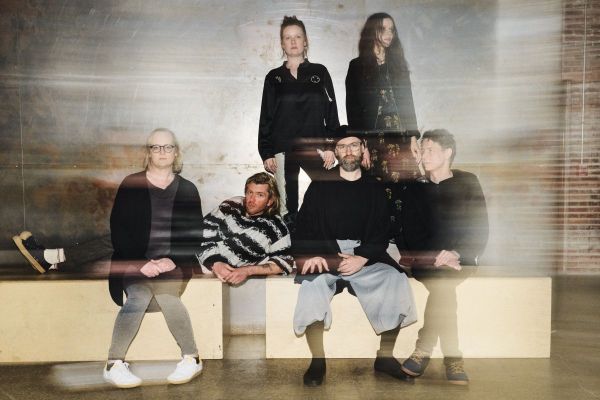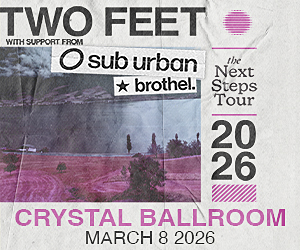Home > Home - Featured
10/28/2025
Múm - The OMN Interview
By MATT HANSEN // Icelandic band played Wonder Ballroom in support of the new album "History of Silence"
It was a sad day in April 2020 when Icelandic band Múm was unable to play Mississippi Studios due to the lockdown order for Covid-19, having to cancel a tour celebrating the 20 year anniversary of their first album Yesterday was Dramatic, Today is OK. And now five years later the sextet is back with the new album History of Silence which meant returning to Portland for a long overdue performance.
Oregon Music News was lucky enough to sit down with Örvar Smárason of Múm when they played Wonder Ballroom to discuss playing festivals, breaks between albums, and the Icelandic music scene.
Oregon Music News: The last time Portlanders were going to see you live, your show at Mississippi Studios was canceled the night Oregon went into lockdown. How did you feel when your 2020 tour was canceled? Were there any plans you had that didn’t happen because of the pandemic?
Örvar Smárason: We were really excited about the tour; we had already done Europe and were just coming over here and it got canceled like 10 days before we were supposed to be on the tour. And it really knocked the wind out of us. Also, we ended up losing a lot of money because these tours you have to pay up front for so many things. It was kind of devastating for us. But it took us just a couple years to get over it. And here we are like everybody else.
OMN: I caught your set at Treefort this year. During your set you said it was “Weird to play for people again.” How do you feel now that you’re touring again? How has the response been?
ÖS: The response we’ve had on those tours has been nothing but amazing, and not just the playing for people part. After every show, I go to the merch table and meet the audience and every single night we’ve had endless stories from listeners. About their own personal experience with the band throughout the years. It’s the most rewarding thing you can get, because it’s been really interesting this time around.
OMN: Is there a common thread with all the stories you are hearing each night? Is there something that you see in all the stories that connects them?
ÖS: We get a lot of people who always want to tell us when and where they’ve seen us, which is really good. It’s a way to connect, it’s like knowing someone. And people seem to have very personal experiences with Múm, some of them are about personal crisis and things like that. It’s very heart-warming for us to hear these stories.
OMN: Is ‘History of Silence’ the most time you have ever had to work on an album?
ÖS: I can look at it in two ways actually. I can look at it that we did this album very quickly, we didn’t spend 12 years doing it. It was just over two years, which is fairly fast. But I also understand that we released the album 12 years ago last time and that it might feel like this has been a really long time coming. Also, because one of the songs on the album was written originally for Go Go Smear the Poison Ivy and recorded on cassette in 2005. I can definitely look at it both ways. What’s different now then before is we could just take time and we could just make an album. This time everyone has lives and everyone is doing something else. We all have different projects; you can hear now in the background Gyða’s solo project and we’ve been working on things a lot like film music. So, we really just find chunks of time to work on things now. Which didn’t used to be the case, we could just take forever making an album.
OMN: I read an interview you did in 2001 and it seemed like you had the same kind of schedule with band members going to and from Berlin/Iceland/Copenhagen. As a band are you still looking for those times when your lives can overlap?
ÖS: That’s really difficult for us. In 2001 when I did that interview for Thumb we had just been in Copenhagen and then we moved to Berlin. And probably around there Gunnar is moving back to Iceland. And Kristín and I kept living in Berlin for five years. I moved back and Gunnar moved to Berlin and he’s still there. So, Berlin has always been a base for us. Berlin plays as much a part of this band as Reykjavík does. But now we're all in different places, like Sigur lives in Athens and Samuli lives in Helsinki. Gyða and I live in Reykjavík. We started this record by going to Italy and renting a studio in a beautiful place for two weeks. We planned to record a whole album in that time. Maybe we just knew we would be happier if we had something and we recorded I think 6 songs there. And we found out it was really important for us to be together in a room doing these things. But after that we knew that to finish the album we just did it in chunks and chunks there. Me and Gunnar would try to come together, he would come to Reykjavík and work for a couple weeks and I would come to Berlin. We tried to do something on tour in New York while I was living in Prague as well. We ended up doing it in bits and pieces, we know we can’t do it without scissors and some glue.
OMN: You’ve played many different types of festivals, and your band is really known for the instrumentation of what you do. What is it like when you play a festival and see how you are being recognized for your sound?
ÖS: We do play a lot of varied festivals. Even high-brow cultural festivals or sometimes we will do jazz festivals or electronic festivals, so I actually think that is a strength. We played Big Ears which is probably the best music festival in the world in terms of musicians. It’s such a musician’s festival. Everyone in the band would just go see shows every day, and to be among those people that was like one of the times we were like “We’re actually okay. and don’t have to fake it, we’re really okay musicians.” Once we shared the bill with Suicide, we played before them in Barcelona, I think Primavera Sound. And that was another one of these moments like “What? Our dressing rooms were next to theirs. What is going on?” Those are the really fun parts.
OMN: There’s definitely a few myths about Scandinavians, one is that everyone is really good at their instrument.
ÖS: Not true.
OMN: And the other is that the reason everyone there is really good is because they have a lot of time when it’s really dark or very light out. Is that one true?
ÖS: I think that can definitely play a part, yeah. I think that both darkness, in terms of Iceland and then parts of Norway, Sweden, Finland, and the isolation plays a part as well. I can mostly just speak to the Icelandic music scene but so much of it was and probably is still built on just doing something to entertain your friends. In some of the bands you are entertained because you get to play for your friends. And they enjoy it, and then they would start a band. Just to make something. I think that was also a strength in Iceland, there were no bands dreaming of making it. Nobody started a band to “make it.” With the smallness, it’s often better not to put yourself into a genre. You need to be kind of open so you are open to more people. And most people do play in bands, almost every Icelandic musicians does this, plays in different types of bands.
OMN: How many Múm side projects are currently active?
ÖS: There are so many different bands, like Roberta, she’s in the jazz scene so she is in a lot of things. I’m still active in maybe 4 bands right now, but there used to be a lot more. This is the cut down version.








